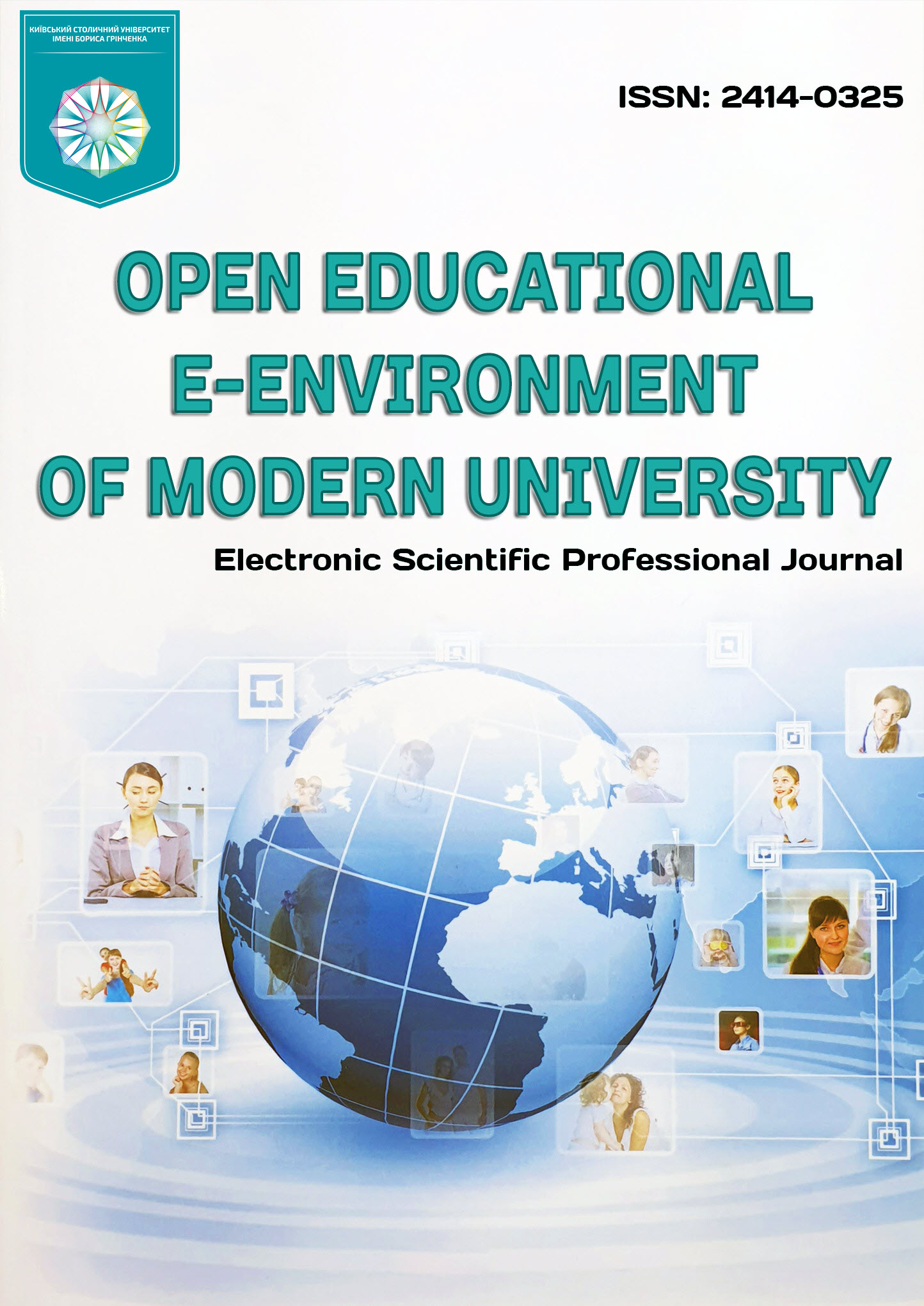CLASSTIME ЯК СКЛАДОВА ЦИФРОВОГО КЕЙСУ ВЧИТЕЛЯ МАТЕМАТИКИ
DOI:
https://doi.org/10.28925/2414-0325.2025.181Ключові слова:
цифрові технології, платформа Classtime, інтерактивне навчання, математика, гейміфікація, формувальне оцінювання, освітні інноваціїАнотація
Стаття присвячена дослідженню ефективності використання цифрової платформи Classtime у навчанні математики та розробці методичного кейсу для вчителів. Метою роботи є визначення способів інтеграції платформи в навчальний процес, що сприятиме підвищенню мотивації учнів, їхньої пізнавальної активності та формуванню ключових компетентностей. У ході дослідження було використано методи аналізу, синтезу, порівняння та узагальнення, які дозволили оцінити вплив платформи на якість навчального процесу. Також було застосовано емпіричні методи для аналізу реального досвіду використання Classtime у шкільному середовищі.
Результати дослідження показали, що використання платформи позитивно впливає на активність учнів, стимулює їх до самостійного мислення, розвиває співпрацю та ініціативність. Гейміфікація, яка реалізується за допомогою командних ігор, підвищує емоційну залученість школярів і сприяє їхній соціальній взаємодії. Інтерактивні завдання та формувальне оцінювання забезпечують вчителю можливість оперативного відстеження прогресу учнів, що є особливо важливим у складних умовах воєнного стану в Україні. Запропонований методичний кейс включає інтерактивні завдання, командні ігри та засоби оцінювання, що дозволяють зробити уроки математики сучасними, ефективними й доступними.
Наукова новизна роботи полягає в комплексному аналізі використання Classtime у навчанні математики в умовах соціальних і освітніх викликів, пов’язаних із воєнним станом. Практичне значення отриманих результатів полягає у можливості застосування запропонованого підходу як у роботі вчителів математики, так і в системі підготовки майбутніх педагогів. Використання платформи Classtime дозволяє забезпечити інтерактивність, гнучкість і високу якість навчання, що відповідає сучасним потребам освітнього процесу.
Завантаження
Посилання
Bykov, V. Y., Lytvynova, S. H., & Shyshkina, M. P. (2022). Scientific and methodological support for the digitalization of education in Ukraine: Current state, problems, and prospects. Bulletin of the National Academy of Educational Sciences of Ukraine, 4(2), 1-49 (in Ukrainian).
Zhaldak, M. I., Mykhalin, H. O., & Biliay, I. M. (2019). Using interdisciplinary connections and analogies in teaching theory. Scientific Notes of the Department of Pedagogy, 45, 22-29 (in Ukrainian).
Morze, N. V., Kremen, V. H., & Bykov, V. Y. (2022). Digital transformation of higher education institutions in the context of digitalization of society: Challenges and prospects. Scientific Bulletin of Uzhhorod University. Series: Pedagogy. Social Work, 2(51), 157-162 (in Ukrainian).
Novytskyi, O., & Spirin, O. (2024). Methods and Tools for Building Open Systems of Scientific Research Support. UkrPROG 2024, 449-461.
Hurzhiy, A., Bakhmat, N., Kartashova, L., & Zaichuk, V. (2024). Development of creativity in education seekers through generative artificial intelligence tools. New Learning Technologies, (98), 42-49. (in Ukrainian).
Burov, O. Y., Lytvynova, S. H., Nosenko, Y. H., & Sukhikh, A. S. (2024). Analytical materials on the use of immersive technologies in general secondary education institutions. (in Ukrainian).
Yatsyshyn, A. V. (2021). Theoretical and methodological foundations of using open digital systems in the preparation of PhD and Doctoral candidates in educational sciences (Doctoral dissertation, Institute of Information Technologies and Learning Tools). (in Ukrainian).
Ifenthaler, D., Hofhues, S., Egloffstein, M., Helbig, Ch. (Eds.). (2021). Digital Transformation of Learning Organizations. Springer Cham. https://doi.org/10.1007/978-3-030-55878-9
Bottino, R. (2020). Schools and the digital challenge: Evolution and perspectives. Educ Inf Technol, 25, 2241– 2259. https://doi.org/10.1007/s10639-019-10061-x
Viberg, O., Mavroudi, A., Bälter, O., Mohammad, M. Kh. (2020). Validating an Instrument to Measure Teachers’ Preparedness to Use Digital Technology in their Teaching. Nordic Journal of Digital Literacy, 15 (01). https://doi.org/10.18261/issn.1891-943x-2020-01-04
Torres-Hernández, N., Gallego-Arrufat, MJ. (2022). Indicators to assess preservice teachers’ digital competence in security: A systematic review. Educ Inf Technol. DOI: https://doi.org/10.1007/s10639-022-10978-w
Hrybiuk, O. O. (2020). Level model of inquiry-based mathematics learning using a computer-oriented methodological system, Information Technologies and Learning Tools, 77(3), 39-65. (in Ukrainian).
Marienko, M. V. (2019). Designing a cloud-oriented methodological system for professional development of science and math teachers for academic lyceums, Information Technologies and Learning Tools, 70(2), 161-175. (in Ukrainian).
Kovbasiuk, T., & Panina, L. (2020). Using modern educational tools to improve the digital competence of the NUS teacher. In Proceedings of the 8th International Scientific and Methodological Conference "Critical Thinking in the Age of Toxic Content", Kyiv: Tsentr Vilnoi Presy, Akademiia ukrainskoi presy, 417-421. (in Ukrainian).
Panina, O. (2016). Methodical features of teaching physics to marine university cadets considering cognitive perception specifics and the influence of ICT factors, Collection of Scientific Papers, 4, 143-154. (in Ukrainian).
Tryfonova, O. M., Sadovyi, M. I., & Somenko, D. V. (2024). Methodology of teaching educational transformation challenges to students of natural-mathematical and digital specialties. Scientific Bulletin of the South Ukrainian National Pedagogical University named after K. D. Ushynsky, 3(148), 71-76. (in Ukrainian).
Drijvers, P. (2013). Digital technology in mathematics education: why it works (or doesn't). PNA, 8(1), 1-20.
Greefrath, G., & Hertleif, C. (2018). Mathematical modelling with digital tools – a quantitative study on mathematising with dynamic geometry software. ZDM, 50(1-2), 233-244.
Clark, C. (1997). Using action research to foster a creative response to teaching mathematics. High Ability Studies, 8(1), 48-56.
Hoyles, C. (2018). Transforming the mathematical practices of learners and teachers through digital technology. Research in Mathematics Education, 20(2), 209-228.
Pierce, R., & Stacey, K. (2001). Observations on students' responses to learning in a CAS active learning environment. Mathematics Education Research Journal, 13(1), 28-46.
On amending the Regulation on the procedure for implementing innovative educational activities. Order of the Ministry of Education and Science of Ukraine No. 994 of 11.07.2017. https://zakon.rada.gov.ua/laws/show/z1171-17#Text (in Ukrainian).
Ovcharuk, O. (2003). Competencies as a key to updating the content of education. Strategy for reforming education in Ukraine: Recommendations on educational policy. Kyiv: K.I.S, 14-43 (in Ukrainian).
Concept "New Ukrainian School". https://mon.gov.ua/static-objects/mon/sites/1/zagalna%20serednya/nova-ukrainska-shkola-compressed.pdf (in Ukrainian).
Oliinyk, V. V., Hrabovskyi, P. P., & Konoval, O. A. (2022). Criteria and indicators for selecting a digital learning platform for general secondary education institutions]. Information Technologies and Learning Tools, 4(90), 19-31. (in Ukrainian).
Shchetynina, O., Horbatiuk, L., Alieksieieva, H., & Kravchenko, N. (2019). Project management systems as means of development students time management skills, using software tools. In ICTERI 2019: 15th International Conference on ICT in Education, Research, and Industrial Applications, June 12–15, Kherson, Ukraine. CEUR Workshop Proceedings, Vol. 2387, 370-384. http://ceur-ws.org/Vol-2387/20190370.pdf
Nagay, I., Khalabuzar, O., Alieksieieva, H., Antonenko, O., & Ovsiannikov, O. (2023). Peculiarities of the formation of students’ business communication skills within the distance learning. Education Research International, Vol. 2023, 1-8. https://doi.org/10.1155/2023/9660270.
Bilyk, M., & Kalashnikov, I. (2024). Impact of the digital environment surrounding students on their competence level in mathematics. Didactics of Mathematics: Theory, Experience, Innovations, 1, 89-97. https://doi.org/10.31652/3041-2277-2024-1-89-97 (in Ukrainian).
Vakaliuk, T. A., & Marienko, M. V. (2021). Experience of using cloud-oriented open science systems in the process of training and professional development of teachers of natural and mathematical subjects. Information Technologies and Learning Tools, 81(1), 340–355. https://doi.org/10.33407/itlt.v81i1.4225 (in Ukrainian).
Alieksieieva, H., Kravchenko, N., Horbatiuk, L., Nestorenko, T., Zhyhir, V., Kalinichenko, A., & Glazova, Y. (2025). Digital transformation of relocated higher education institutions in Ukraine under martial law. Problems and Perspectives in Management, 23(2-si), 71-85. http://dx.doi.org/10.21511/ppm.23(2-si).2025.06.
Classtime. (2025). Classtime – Empowering Teachers. Engaging Students. LinkedIn. April 9, 2025 https://www.linkedin.com/company/classtime
Bakhov, I., Opolska, N., Bogus, M., Anishchenko, V., & Biryukova, Y. (2021). Emergency distance education in the conditions of COVID-19 pandemic: Experience of Ukrainian universities. Education Sciences, 11(7), 364.
Yurchyshyn, O. Ya., Stepanets, O. V., & Skorobogatova, N. Ye. (2023). Analysis of digital technologies in Ukraine: Problems and prospects. CEUR Workshop Proceedings, Vol. 3781, 132-140. https://ceur-ws.org/Vol-3781/paper15.pdf
Mathematical educational field: Grades 5-6 (adaptive cycle) of the New Ukrainian School: A methodological guide for teachers of general secondary education institutions, compiled by T. V. Svetlova, edited by I. V. Udovychenko (2022). Sumy: NVV KZSIPPO, 64 p. (in Ukrainian).
Опубліковано
Як цитувати
Номер
Розділ
Ліцензія
Авторське право (c) 2025 Алєксєєва Г. М., Пришляк О. В., Лаврик В. В., Кравченко Н. В.

Ця робота ліцензується відповідно до Creative Commons Attribution-NonCommercial-ShareAlike 4.0 International License.










1.jpg)







